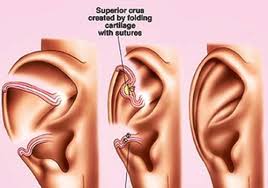Description
Ear Surgery: Restoring Hearing and Improving Quality of Life
Ear surgery, also known as otology surgery, encompasses a range of procedures designed to address various ear-related conditions affecting both hearing and balance. These procedures are performed by highly specialized otolaryngologists (ENT doctors) who are expertly trained in the intricate anatomy and physiology of the ear.
Types of Ear Surgeries:
This section details some common ear surgeries performed:
- Myringotomy with or without Tube Placement (Tympanostomy): This procedure involves creating a small incision in the eardrum (tympanic membrane) to relieve pressure from fluid buildup in the middle ear. This is often done for children with recurrent ear infections. Pressure equalization (PE) tubes may be inserted through the incision to allow for drainage and ventilation.
- Ossiculoplasty: This surgery repairs or reconstructs the tiny bones (ossicles) of the middle ear that are responsible for transmitting sound vibrations. This is often necessary following trauma, infection, or otosclerosis (a bone growth disorder). The goal is to improve conductive hearing loss.
- Stapedectomy/Stapedotomy: These procedures are specifically designed to address otosclerosis, a condition where the stapes bone becomes fixed, hindering sound transmission. The stapes is either partially removed and replaced (stapedectomy) or a small hole is made in it (stapedotomy), restoring normal sound conduction.
- Tympanoplasty: This reconstructive surgery repairs a perforated or damaged eardrum. It involves grafting material onto the eardrum to restore its integrity and improve hearing.
- Mastoidectomy: This procedure involves removing diseased bone from the mastoid process (the bony prominence behind the ear). This is commonly performed to treat chronic middle ear infections (cholesteatoma), which can cause hearing loss and potentially damage the inner ear structures.
- Cochlear Implant Surgery: This is a major surgical procedure for individuals with severe-to-profound sensorineural hearing loss. A small electronic device is surgically implanted in the inner ear to stimulate the auditory nerve, allowing for the perception of sound.
- Surgery for Cholesteatoma: Cholesteatoma, a growth of skin cells in the middle ear, requires surgical removal to prevent damage to surrounding structures, including hearing bones and the inner ear.
Reasons to Consider Ear Surgery:
Ear surgery may be necessary to address a variety of conditions, including:
- Hearing loss (conductive or mixed): Surgery can often improve hearing in cases of conductive hearing loss caused by problems in the outer or middle ear.
- Recurrent ear infections: Myringotomy with tube placement can reduce the frequency and severity of ear infections in children.
- Chronic ear infections: Mastoidectomy may be necessary for chronic infections that do not respond to medical treatment.
- Cholesteatoma: Surgical removal is crucial to prevent further damage and complications.
- Otosclerosis: Stapedectomy or stapedotomy can improve hearing loss due to otosclerosis.
- Balance disorders: Some ear surgeries may address specific balance problems.
Recovery and Risks:
The recovery process varies depending on the type of surgery performed. Possible risks include infection, bleeding, dizziness, hearing loss (although this is usually avoided or minimized), and facial nerve damage (a rare complication). Your surgeon will discuss the specific risks and recovery expectations associated with your individual procedure.
Important Considerations:
This information is for general knowledge and should not be considered a substitute for professional medical advice. Consult with a qualified otolaryngologist to determine if ear surgery is appropriate for you and to discuss the specific details of your situation. They will conduct a thorough examination, assess your hearing, and recommend the best course of action. They will also discuss potential risks, benefits, and alternatives to surgery.
